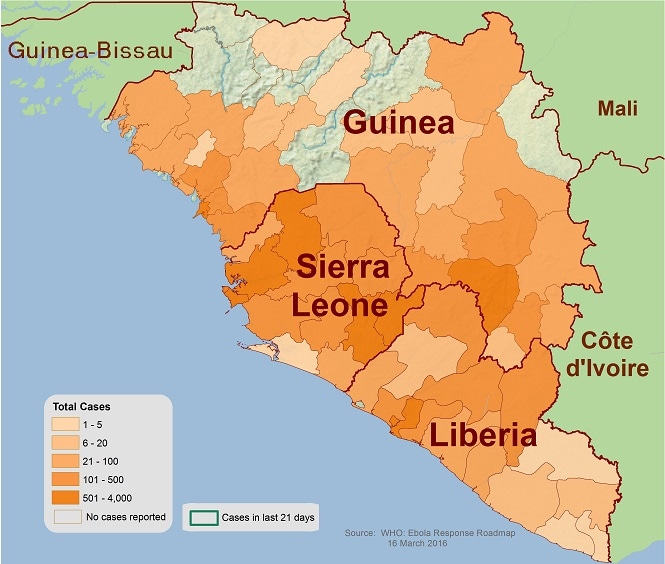U.S. Troops to Deploy to West Africa to Help Contain Ebola Outbreak
September 17, 2014

Map of Ebola virus outbreak in West Africa as of 2014. (E. Ervin, CDC/ESVP, Sept. 4, 2014)
Yesterday, speaking at Atlanta’s Center for Disease Control and Prevention (CDC), United States President Barack Obama announced that he was sending 3,000 troops to Western Africa to aid the hard-hit nations of Liberia, Sierra Leone, and Guinea in fighting an outbreak of the Ebola virus. The 2014 outbreak of the disease has been the largest in history; more than 5,000 cases have been reported in West Africa, with 2,961 people dead.
Ebola can have up to a 90 percent fatality rate in people infected with the disease. It is a hemorrhagic disease, meaning that, in addition to vomiting and diarrhea, patients often bleed uncontrollably both internally and externally (from the eyes and under the skin, for example), with fluid loss causing shock and death. Most hemorrhagic viruses have a host, often a rodent or insect, which carries the virus but does not become ill. Scientists have not yet identified the host for Ebola virus, but a species of fruit bat is strongly suspected. Ebola enters the human population via an infected animal—for example, by people preparing bushmeat infected with the disease. The virus is then spread within the human population by contact with the blood or other bodily fluids of an infected person, body tissue, or unsterilized needles or other equipment. A shortage of hospitals, health care workers, and medical equipment have seriously hindered West African nations in stopping the spread of the disease.
The U.S. military will train up to 500 health care workers per week on how to treat people with such highly infectious diseases and set up field hospitals to treat Ebola patients. In addition, home health-care kits will be provided for hundreds of thousands of households to allow families to more safely care for patients at home.
Additional World Book articles:
- The Origin of New Diseases (a special report)
- Overpopulation and the Threat of Infectious Disease (a special report)


